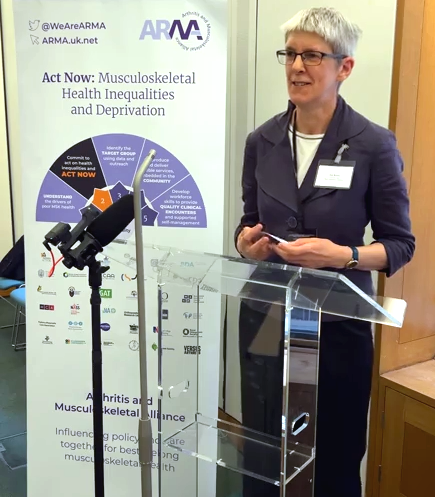 by Sue Brown, CEO ARMA
by Sue Brown, CEO ARMA
Last week I was in London with ARMA trustees discussing future plans and opportunities. An optimistic, upbeat meeting full of hope and pride in an organisation that is making a difference. One thing which will make a difference to those opportunities will be the outcome of the Government’s new ten year plan for the NHS.
With the inclusion of MSK in the Major Conditions Strategy we had begun to make progress. It is vital that we don’t lose that. Good MSK health is vital to families, the NHS and the economy. MSK health is fundamental to our ability to move, work, learn and live a healthy life. As the leading cause of years lived with disability, and one of the two biggest reasons for being unable to work for health reasons, MSK should be up there with the other major contributors to ill health.
The Government has identified three “shifts”: hospital to community, analogue to digital, and sickness to prevention. All of these are relevant to MSK.
What is frustrating is that we know what works for managing long-term MSK conditions. We just don’t do it. Like other conditions there is a big opportunity with prevention, but we can’t prevent it all. Once people have a long-term MSK condition they need any treatment that will be effective in a personalised and timely manner. And they need support to manage that condition.
We know what works for self-management – not advice and a leaflet or an app but peer support, health coaching, social prescribing. We just don’t do it. Is that because it’s not shiny, it’s not visible, it doesn’t make for good photo opportunities? It happens online, in clinics, in village halls, swimming pools, parks and gyms. Perhaps it’s because you can’t do a blood test or wear a device as you might track cholesterol or blood sugar levels. You have to listen to people to understand if it’s working.
We know it works because people with significant pain who thought they would never work again return to work. People are able to play with their children, take part in activities they have had to give up, quality of life improves, mental health is better.
I have three shifts I would like to see:
- Shifting focus to the conditions with the biggest impact on population health.
- Shifting measurement to what matters to patients.
- Shifting priorities so that community support, in its widest sense, has parity of esteem with hospital care.
These three shifts would help not just people with MSK conditions, but all those struggling to live with a long-term condition that our NHS as it currently stands is poorly prepared to address. We know that the rise in long-term conditions will continue. We know that pain is the one that will rise the most, and that most of that pain is MSK pain. We know this is happening, we know what to do.
Does this Government have the courage to give us an NHS for the 21st century, instead of one designed to tackle the challenges of the early 20th? Time will tell.
